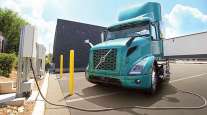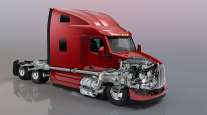Staff Reporter
Fleet Owners Urged to Be Familiar With CARB Emission Proposal

[Stay on top of transportation news: Get TTNews in your inbox.]
WASHINGTON — Trucking companies should educate California regulators about potential impacts of a new regulation before it takes effect and becomes a model for the nation, according to fleet experts.
This was the message given to attendees of the Technology & Maintenance Council’s 2022 Fleet Data Management & Cybersecurity Conference during a special presentation about potential impacts of California Air Resources Board regulations on the trucking industry.
The session, held June 13, was part of an event hosted by American Trucking Associations in its new Washington headquarters.
Glen Kedzie, ATA vice president of energy and environmental counsel, described CARB as “a petri dish of innovation” for U.S. environmental policy and predicted “a lot of states will copy” its zero-emission regulations directed at commercial trucks.
Kedzie discussed CARB’s Advanced Clean Truck Regulation (the first of its kind in the nation) that was approved in June 2020 and will take effect in 2024, as well as its proposed Advanced Clean Fleets Regulation.
The Clean Truck Regulation has mandates for manufacturer sales of zero-emission trucks and requirements for company and fleet reporting.
Manufacturers who certify Class 2b-8 chassis or complete vehicles with combustion engines must sell zero-emission trucks as an increasing percentage of their annual California sales starting in 2024. By 2035, zero-emission truck/chassis sales must account for 55% of Class 2b–3 truck sales, 75% of Class 4–8 straight truck sales and 40% of truck tractor sales.
When CARB approved the clean truck regulation, its chair, Mary Nichols, declared, “Diesel vehicles are the workhorses of the economy, and we need them to be part of the solution to persistent pockets of dirty air in some of our most disadvantaged communities. Now is the time — the technology is here and so is the need for investment.”

Nichols
Kedzie described the Clean Fleets rule as part of CARB’s goal to develop a smog-check program for trucks similar to passenger car’s emission control programs. The rule mandates that owners of 50 or more trucks must provide information to CARB about existing fleet operations to identify future strategies for fleets to buy zero-emission trucks and put those vehicles into service where suitable.
Under the Clean Fleet Rule, zero-emission fleet percentages would start at 10% in 2025 for box trucks, vans and yard trucks with 100% by 2035. Work trucks and day cab tractors would begin in 2027 with 10% followed by 100% by 2039. The last category for sleeper cab tractors and specialty vehicles takes effect in 2030 with 10% before 100% by 2042.
Kedzie said the fleet rule was adopted by CARB in December and could be finalized by the state Office of Administrative Law as early as later this year. He noted that ATA and others have been working with CARB for a year and a half on the rule.
The rule would require the transmission of significant amounts of data in 16 different categories to be given by fleets to CARB. It also would impose a $30 annual per-vehicle fee. In-state trucks would be identified for CARB requirements through the registration process, and out-of-state trucks could be discovered in various ways including inspections and cameras.
Urban Johnson, a heavy-vehicle cybersecurity expert, said CARB is moving into getting real-time information from fleets to help remove polluting diesel-fueled heavy trucks off the road and encourage better truck maintenance habits.
He said the type of information being sought by CARB is much more involved than mere “requests for engine hours” and “everyone’s looking for more remote interactions with vehicles.’

How can trucking companies persuade new drivers to stay? Host Mike Freeze brings in onboarding expert Anthony Pellegrino of Ag Energy Transport. Tune in above or by going to RoadSigns.TTNews.com.
If trucking companies have the ability to lobby CARB, they should do so, Johnson urged, noting that fleets need “to understand what is being proposed” in terms of zero emissions, real-time enforcement and cybersecurity concerns stemming from large amounts of fleet data going to different state government organizations and privacy issues.
He added that when he discussed forthcoming regulations with fleet owners “some were horrified,” particularly with potential provisions that could result in rewiring challenges.
CARB is accepting public comments to be submitted in an online comment docket about the Clean Fleets ruling regarding draft regulation language. So far, a Workshop Comments Log lists input provided by 144 people. The proposed regulations focus on high priority (more than 50 trucks) and federal fleets, state and local government fleets, drayage trucks and 100% zero-emission vehicle sales.
Want more news? Listen to today's daily briefing below or go here for more info:




